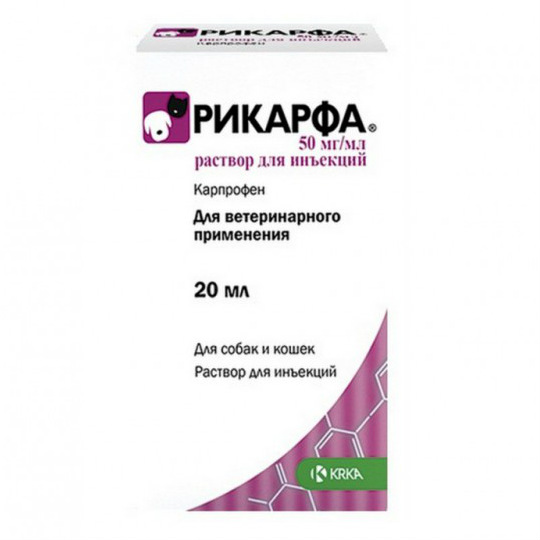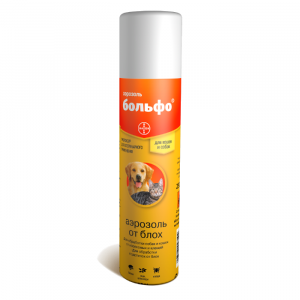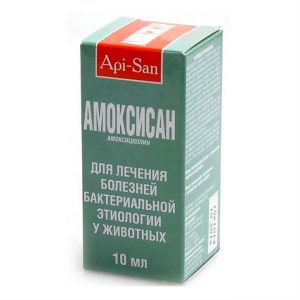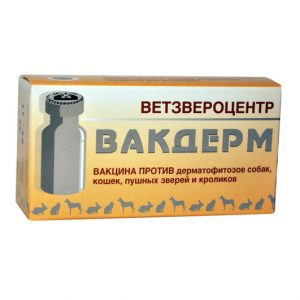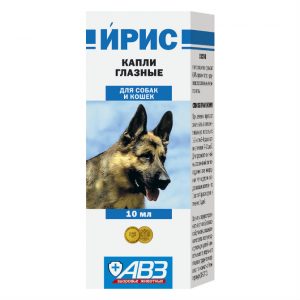Description
Pharmacological action of
NSAIDs. It has anti-inflammatory, analgesic and antipyretic effects.
Carprofen, like other NSAIDs, inhibits COX in the arachidonic acid cycle. In this case, the drug mainly affects COX-2, which is induced in response to the development of inflammation. As a result, the synthesis of inflammatory prostaglandins that cause inflammation, swelling, and pain is blocked. In therapeutic doses, carprofen has a significantly weaker effect on COX-1, and therefore does not affect the synthesis of protective prostaglandins. Thus, carprofen does not interfere with normal physiological processes in tissues, especially in the stomach, intestines, kidneys and platelets.
Carprofen is rapidly absorbed from the injection site and penetrates most organs and tissues, more than 99% of carprofen binds to plasma proteins. The drug is metabolized in the liver, excreted mainly with feces (about 80%) and partially with urine. The half-life in dogs is about 8 hours, in cats – 19 hours.
RikarfaВ® is classified as a moderately hazardous substance by the degree of exposure to the body (hazard class 3 according to GOST 12.1.007-76).
Indications
– To relieve pain and inflammatory reactions after surgery, as well as during sedation or during anesthesia in dogs and cats.
Contraindications
– intramuscular injection of the drug.
It is forbidden to use: – pregnant animals
– simultaneously with other NSAIDs, as well as within 24 hours before their use and 24 hours after the end of their use.
With caution and under the supervision of a veterinarian, the drug should be prescribed to animals with diseases of the heart, kidneys, liver and gastrointestinal tract.
Special instructions
In case of allergic reactions, the drug is discontinued and antihistamines and symptomatic treatment are prescribed.
Ricarda® is compatible with medications used in premedication and anesthesia for dogs and cats.
Ricarda® is not intended for use by productive animals.
Personal preventive measures
When working with the drug, you must follow the general rules of personal hygiene and safety precautions provided for when working with medicinal products for animals.
People with hypersensitivity to carprofen should avoid direct contact with the drug. If the drug accidentally gets on the skin or mucous membranes, it must be washed off with running water and soap. In case of allergic reactions and / or accidental ingestion of the drug, you should immediately contact a medical institution (you should have the instructions for use of the drug or a label with you).
It is forbidden to use empty containers from under the medicinal product for domestic purposes, it must be disposed of with household waste.
Composition
Injection solution pale yellow, clear.
1 ml
carprofen 50 mg
Excipients: benzyl alcohol, arginine, glycocholic acid, lecithin, sodium hydroxide, hydrochloric acid, water d / i.
Dosage and administration
For dogs, the drug is administered iv or sc at a dose of 4 mg / kg carprofen (1 ml of the drug per 12.5 kg of animal weight). To prolong analgesia, the drug is re-administered after 24 hours in half dose (2 mg of carprofen per 1 kg of body weight). If further therapy is necessary, treatment can be continued with the appointment of Rikarf® tablets.
For cats, the drug is administered once in / in or sc in a dose of 4 mg / kg (0.24 ml of the drug per 3 kg of animal weight).
Features of the drug during its first use and withdrawal have not been established.
Violation of the recommended dosage regimen should be avoided, as this can lead to a decrease in therapeutic effectiveness, or to the occurrence of side effects.
Side effects
When using the drug in accordance with the instructions, side effects and complications, as a rule, are not observed.
When using the drug RikarfaВ®, as with other NSAIDs, in rare cases, the animal may experience irritation of the gastric mucosa and vomiting.
dosage form
injection
